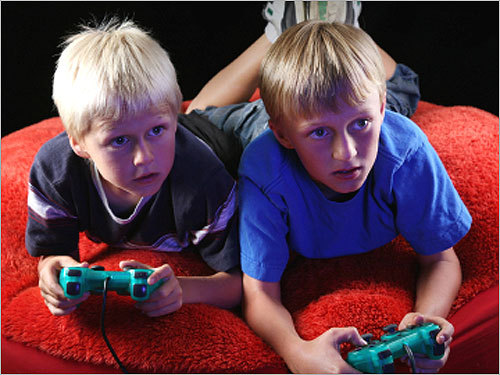The Little Gamer- Video Games & Violence
13/01/2013 13:22

“So, if falling crime rates coincide with the rise of violent video games and increasing violence on TV and at the cinema, should we conclude that media violence is causing the drop in crime rates?” – Hugh Mackay
There has always been a massive controversay about videogames and whether or not they increase violence.
The general outcome of studies performed on videogames have shown that playing video games increases your attention, reflexes, mental control, visual ability and even decision-making skills (The Guardian). Studies looking at violence within the entire media (e.g. the news, films, tv, video games) are shown to have a short term increase in aggression (The American Psychological Association).
But is this really a problem?
Media has also been shown to give an increase in positive traits and behaviours, such as altruism. Lots of children’s TV programmes are filled with lessons and acts of altruism which indirectly encourage children to behave in the same way. After watching Lassy, more children said they would attempt to rescue a puppy from a well than they did when they hadn’t watched the film.
As always, there are pros and cons with everything. Just because your child/teen plays a lot of violent video games, it doesn’t mean that they lose sight of what is right and wrong.
However, if you are concerned about the effects the videogames might be having on your child, here are some tips to help you keep an eye on things;
- Watch your child/teen play the game – this means that you can monitor the content and make sure your child isn’t playing games that are rated for older children.
- Discuss the content with your child - Brian Baglow, who worked on the first Grand Theft Auto (GTA) game back in 1997, said that they key thing was discussing the game content with your child and finding out how they feel about it. Usually their answer will be “Excited, happy or thrilled”, but if my some chance the game is unsettling your child, you will then know about it and be able to take appropriate action (e.g. keeping the game back for when they are a bit older, or playing it with them).
- Make sure your child can distinguish from fantasty and reality –Again, this involved discussion. Chances are they will recognise the fantasy, and simply find videogames a good way to relax and let out any aggressive feelings.
- Time Management -If you feel like your child is spending too much time on videogames (the average child plays for 9.5 hours a week), get them involved in other activities, take them out for the day or go to a club.
The key thing is to keep an eye on things and dicuss them with your child/teen.
Brian Baglow –“"My son’s favourite game is (currently) Fifa and it's not made him a world class footballer. Similarly, his love for Modern Warfare 3 has not turned him into a special forces ninja, or a troubled, heavily-armed loner."”





